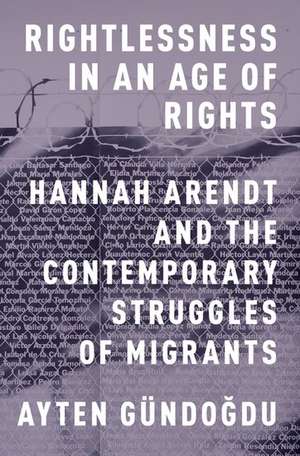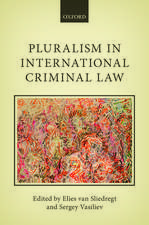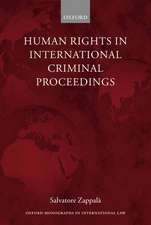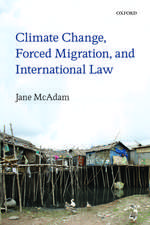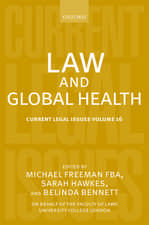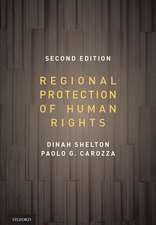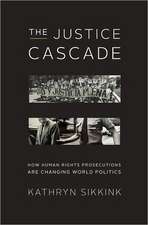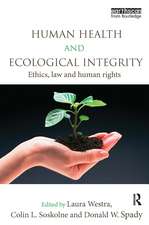Rightlessness in an Age of Rights
Autor Ayten Gundogduen Limba Engleză Paperback – 29 ian 2015
| Toate formatele și edițiile | Preț | Express |
|---|---|---|
| Paperback (1) | 291.71 lei 31-37 zile | |
| Oxford University Press – 29 ian 2015 | 291.71 lei 31-37 zile | |
| Hardback (1) | 762.14 lei 31-37 zile | |
| Oxford University Press – 29 ian 2015 | 762.14 lei 31-37 zile |
Preț: 291.71 lei
Preț vechi: 331.32 lei
-12% Nou
Puncte Express: 438
Preț estimativ în valută:
55.82€ • 58.44$ • 46.19£
55.82€ • 58.44$ • 46.19£
Carte tipărită la comandă
Livrare economică 26 martie-01 aprilie
Preluare comenzi: 021 569.72.76
Specificații
ISBN-13: 9780199370429
ISBN-10: 0199370427
Pagini: 312
Dimensiuni: 231 x 155 x 23 mm
Greutate: 0.38 kg
Editura: Oxford University Press
Colecția OUP USA
Locul publicării:New York, United States
ISBN-10: 0199370427
Pagini: 312
Dimensiuni: 231 x 155 x 23 mm
Greutate: 0.38 kg
Editura: Oxford University Press
Colecția OUP USA
Locul publicării:New York, United States
Recenzii
In her bold and erudite book on human rights, Ayten Gundogdu has achieved two results: a critical reading of Hannah Arendt, using her 'perplexities' to reveal her thought about statelessness and the right to have rights, and a deconstruction of paradoxes affecting 'universal rights' in our post-totalitarian age, as illustrated by the situation of migrants. The 'undecided struggle' that she describes is grim, but also an eloquent plea for the capacity of victims to become agents of their own history.
Ayten Gundogdu knows she cannot rest content with asking what Hannah Arendt would say about human rights now, which have risen and transformed so substantially over the past half-century. In this marvelous book, Gundogdu reinterprets Arendt's critique, and revises it where necessary, in order to vindicate a promising new approach for the field. Rejecting their deployment as a rhetoric of compassionate aid or even military intervention, Gundogdu shows a truly political vision of human rights will engage the social realm and prompt the reinvention of claims and movements beyond their contemporary limitations. The result is an exemplary lesson in how to connect past thinking with present realities.
Bristling with insights into the plight of migrants in today's global economy, Gundogdu's book offers a creative rereading of Hannah Arendt's controversial critique of human rights. She perceptively grasps that the key insight in Arendt's difficult notion of a 'right to have rights' is not to ground rights in a normative foundation but to reanimate them as quotidian political practices of founding. In this way, Gundogdu offers a fresh response to the tenacious problems of rightlessness which at once includes and goes well beyond juridical appeals to the sovereign state.
Ayten Gundogdu knows she cannot rest content with asking what Hannah Arendt would say about human rights now, which have risen and transformed so substantially over the past half-century. In this marvelous book, Gundogdu reinterprets Arendt's critique, and revises it where necessary, in order to vindicate a promising new approach for the field. Rejecting their deployment as a rhetoric of compassionate aid or even military intervention, Gundogdu shows a truly political vision of human rights will engage the social realm and prompt the reinvention of claims and movements beyond their contemporary limitations. The result is an exemplary lesson in how to connect past thinking with present realities.
Bristling with insights into the plight of migrants in today's global economy, Gundogdu's book offers a creative rereading of Hannah Arendt's controversial critique of human rights. She perceptively grasps that the key insight in Arendt's difficult notion of a 'right to have rights' is not to ground rights in a normative foundation but to reanimate them as quotidian political practices of founding. In this way, Gundogdu offers a fresh response to the tenacious problems of rightlessness which at once includes and goes well beyond juridical appeals to the sovereign state.
Notă biografică
Ayten Gundogdu is Assistant Professor of Political Science at Barnard College-Columbia University.
